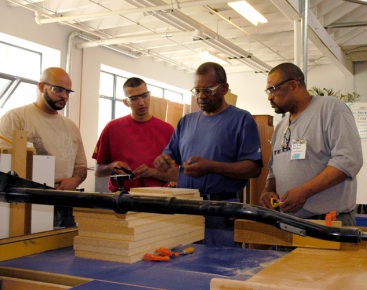 Last week I visited a plywood veneer plant company that has been tooling up with equipment, including a couple automated splicers, and now plans on adding employees.
Last week I visited a plywood veneer plant company that has been tooling up with equipment, including a couple automated splicers, and now plans on adding employees.
The biggest challenge? "Hiring,"the plant manager told me. "You wouldn't think it would be, with unemployment like it is. But it is hard to find people."
For the expanding wood industry, workers come from general applicants, vocational training programs, and from other industries that are shedding works.
The woodshop at the Greater West Town Training Partnership (GWTTP) in Chicago is one example of potential sources of workers. The inner city Chicago training center is housed in brightly lit quarters - the shop recently relocated to a factory remodeled to LEED standards - with late model panel processing and woodworking tools, and trainers.
It also boasts a list of wood manufacturers seeking grads.
GWTTP holds weekly open houses and promotes itself reasonably well to business and the community. Treasury Secretary Timothy Geithner and U.S. Senator Dick Durbin (D-IL) have been recent visitors, praising the facility as a model for training workers.
 GWTTP's Woodworking and Solid Surface Manufacturing Training Program has graduated 589 trainees since it launched in 1993. Instructor Doug Rappe is also a trained Woodwork Career Alliance Skill evaluator - which allows him to verify candidates from his training center, or other woodworking businesses, and issue passport stamps certifying their skills.
GWTTP's Woodworking and Solid Surface Manufacturing Training Program has graduated 589 trainees since it launched in 1993. Instructor Doug Rappe is also a trained Woodwork Career Alliance Skill evaluator - which allows him to verify candidates from his training center, or other woodworking businesses, and issue passport stamps certifying their skills.
Yet GWTTP is encountering the same challenges in attracting students found in other woodworking training and wood industry businesses.
"What we don't have enough of is students," says Rappe. Why with jobs open and training available are there not enough applicants?
Finding skilled tradesmen and apprentice tradesmen is getting harder in many fields, such as metalworking and welding, says author Adam Davidson, because, he suspects, the pay is too low.
Davidson says, the shortage of candidates for skilled careers may be a product of a resistance to raising pay to attract workers.
Forbes magazine picked up on Davidson's idea, reporting that the Bureau of Labor Statistics finds the number of skilled jobs is dropping, as are wages. But the number of openings will rise, as more people retire and housing improves. This would suggest salaries should increase.
"There very well may be lots of open jobs in this field, but for a median salary of $19K," says J. Maureen Henderson, "workers might opt to work retail – where the median salary for a sales associate is around $25K - and fold sweaters."
Is Henderson right?






Have something to say? Share your thoughts with us in the comments below.